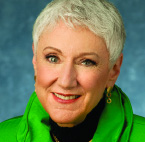Hadassah
President's Column
Staying Relevant
 One of the watchwords of the 1960s was relevance—the idea of being for something larger than ourselves. The idealism of that age fed the growth of the civil rights movement, the birth of environmentalism, the advance of feminism and the questioning of authority, and planted the seeds of debates that are still going on 50 years later.
One of the watchwords of the 1960s was relevance—the idea of being for something larger than ourselves. The idealism of that age fed the growth of the civil rights movement, the birth of environmentalism, the advance of feminism and the questioning of authority, and planted the seeds of debates that are still going on 50 years later.
Hadassah was born in another turbulent time, on the cusp of World War I. But I think the watchword “relevance” from the age of sit-ins, Freedom Riders and antiwar protests helps explain our history and our success.
In 1912, the year of Hadassah’s birth, America had dozens of Jewish organizations devoted to communal welfare, immigrant aid, various religious streams, Zionism, workers’ rights and a host of other causes. A century later, most of those organizations are gone. Hadassah is still a great force in American Jewish life and an integral part of Israel’s health and identity. We have thrived because we have managed to remain relevant across the generations.
One explanation is the durability and simplicity of our mission—to build the Jewish state and strengthen the Jewish people. But wisdom and luck have also been factors—wisdom from leaders and members prepared to embrace the issues of different eras, luck in the form of history that embraced what was built into our ethic.
Zionism was a growing force at the time Hadassah was born, but Henrietta Szold’s vision of practical Zionism, with emphasis on building institutions and claiming a place for women at the table of Jewish leadership, was pivotal. As World War I paralyzed Europe and thrust American Jewry into a leading role in world Zionist affairs, no organization saw its influence, or its relevance, grow so quickly as Hadassah.
For our first half century, Hadassah was a leading player in the creation of Israel, in building its health care infrastructure, in education and in immigrant absorption. As the headlines changed, Hadassah became a central force in pro-Israel advocacy, in fighting the cold war through support for the Soviet Jewish emigration movement and the absorption of Soviet Jews in Israel and as a pioneer with a long history of women’s empowerment even before “feminism” became a household word.
We remain all of these things today. Our health care network became the bedrock of Israel’s medical system and our schools of medicine, nursing, dentistry and public health—not to mention the research and care at our hospitals—are models for the nation and the world. We still nurture immigrants, from Ethiopia, the former Soviet Union and beyond, in our Youth Aliyah villages. Our name carries influence and we are fearless about where we go. Hadassah is the only organization with the word “Zionist” in its name that has NGO status in the United Nations. In America, we are a force for health care advocacy and an engine of empowerment for Jewish women.
Relevance isn’t something that is achieved once for all time. Our task today is to make sure that our name, our mission and our efforts engage a new generation.
One challenge we face is rescuing the very word “Zionism.” For too long, we have allowed others to hijack the name of our national liberation movement and to project their own biases onto our vocabulary. One way we are addressing this is through our “Defining Zionism in the 21st Century” series. This monthly online speakers’ program focuses on the relevance of Zionism today; its goal is to ignite a passion for Zionism that stimulates conversations reflecting a multitude of perspectives.
How Hadassah stayed relevant over a century may sound easy in a 10-paragraph summary, but it was anything but. The clarity of the challenge in front of us is a more accurate way of appreciating all that our mothers and grandmothers accomplished. Now it’s our turn. I’d say we’re ready. That’s why the tagline on the new logo for Hadassah, the Women’s Zionist Organization of America, is The Power of Women Who Do.










 Facebook
Facebook Instagram
Instagram Twitter
Twitter
Leave a Reply